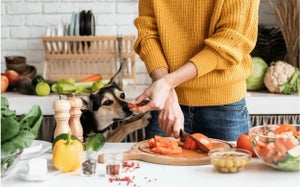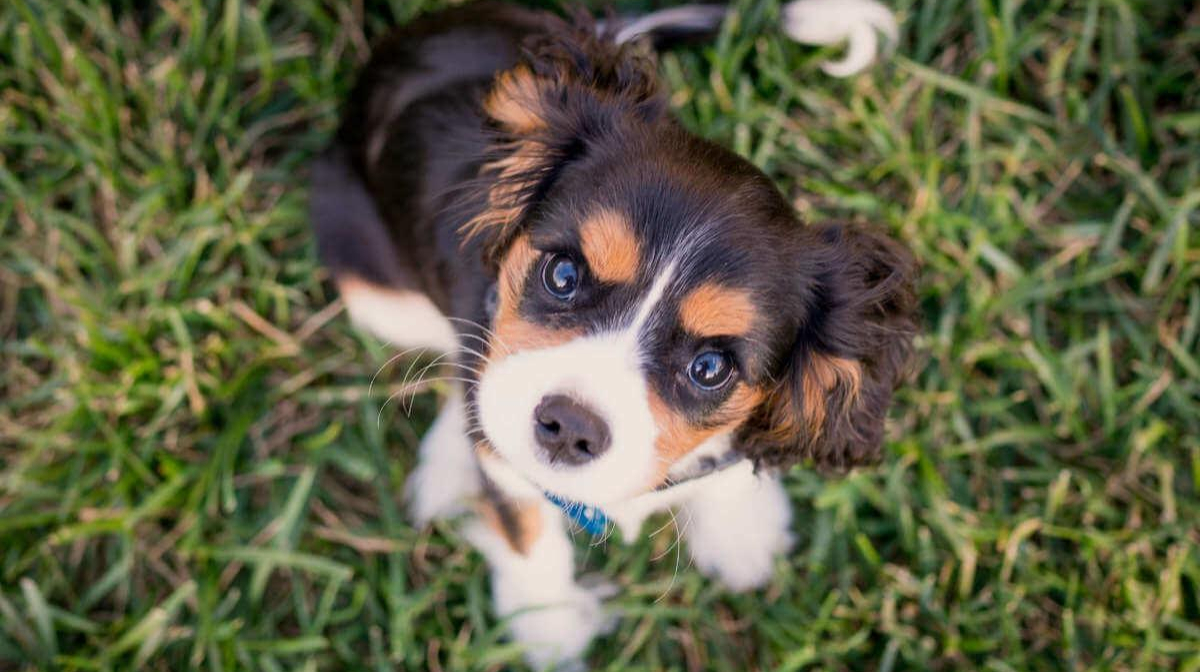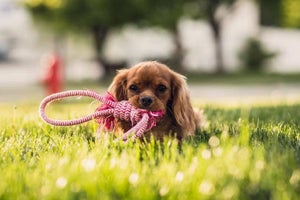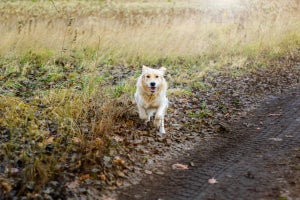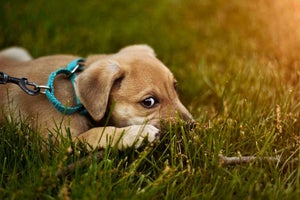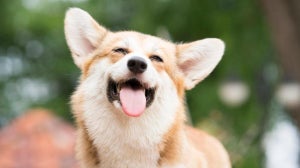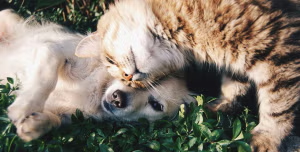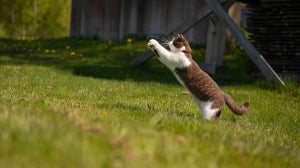
Exercising a puppy is a delicate balance. Encouraging exercise doesn’t just help stimulate growth and keep your dog healthy, but it helps keep your dog calm and to develop good behavioural habits.
Puppies are also very delicate and tire quickly, so too much exercise can be harmful.
It is worth noting that puppies should not play with strange dogs until your puppy has completed his or her vaccinations and your vet gives the go-ahead. This means you will have to find safe ways to exercise your puppy in other ways.
In this article, we will explain how to exercise your puppy the right way, so they expend energy and stimulate their brain at a rate suitable to their growth, and some of the most effective and enjoyable puppy exercises and games.
Two peas in the same pod: feeding and exercising
No discussion about puppy exercise is complete without mentioning puppy food. Diet and exercise go hand in hand: without regular exercise, dogs, like us humans, do not burn off their excess energy and become irritable and overweight, which can lead to a variety of health and behavioural problems.
Conversely, a puppy that does not eat a regular, healthy diet which provides them with the nutrients they need to grow and stay strong, will be underweight, will lack energy, and will not have the things his or her body needs to develop properly.
Puppy nutrition
Puppies grow at a much faster rate than adult dogs, so need different levels of key nutrients in their diet to ensure they develop to their full potential. This is why they should eat puppy food and not dog food made for adults.
Equally, large dogs (i.e. puppies who will be 25 kg or more when they are fully grown) grow at a much faster rate than small or medium-sized dogs. So, again, their diet should reflect this.
Puppies have smaller stomachs than their adult counterparts, so while they need to eat a lot, they should eat smaller meals, more often, throughout the day. For more information on how much to feed your puppy and how to transition from a puppy diet to a junior diet, and eventually to an adult dog food diet, see our handy puppy feeding guide.
How much exercise does a puppy need?
While there are always differences between breeds and individual puppies, including how much energy they need to spend, with the right diet, most owners can expect a puppy to want regular play. However, while they may seem at times to be boundless bundles of playful energy, puppies actually need much less exercise than adults because they are smaller and tire faster.
Rule of thumb: As puppies grow, so does the duration of their exercise
Because puppies grow quickly, so do their exercise requirements change regularly. Remember these important tips to ensure you don’t over-exercise your puppy:
Every dog, whatever their age, needs at least 2 focused exercise sessions a day.
- Duration of exercise sessions should follow a ratio of 5-minutes of exercise per month of age until they reach adulthood:
e.g. if your puppy is 2 months old, then dedicate 2 sessions of 10 minutes every day.
e.g. if they are 5 months old, then dedicate 2 sessions of 25 minutes per day.
Once your puppy has reached adulthood (12-18 months, and sometimes longer for bigger breeds), you can start to enjoy longer exercise sessions.
At what age do puppies have the most energy?
Technically, puppies have more energy as they get older. This is due to them eating larger meals in single sittings and because their bodies and muscles (which store and expend energy) are getting bigger and stronger. However, it doesn’t always seem that way from the perspective of the owner, because puppies manifest their energy in different ways at different times.
0-3 months: Puppies are learning to explore the world around them and their own bodies, so you can expect lots of running, jumping, and play-fighting, interspersed with lots of rest. Use this natural curiosity to begin training your puppy as soon as possible to encourage good behaviours and habits.
3-6 months: This is the age when puppies tend to start going outside and socialising with other dogs. They often haven’t learnt the full extent of their limits yet, so don’t be surprised if they let their excitement of the outdoors get the better of them. You can anticipate this by training them to follow your commands from as early as possible. When your puppy is awake, you can expect them to exhibit a lot of energy for longer. But they will also sleep for longer, too.
6-12 months: Depending on your dog’s breed, they will be close to their full adult size…but don’t be fooled! He or she is still a puppy at heart. They will still have a lot of energy. Not only will you start to teach them good habits, but you can help release some of that energy through training activities.
How much exercise is too much for a puppy?
As ever, it depends on the breed and the individual puppy. For example, Border Collies were bred for longer bouts of exercise, so Border Collie puppies can run around for longer than, say, a Poodle puppy. However, it also depends on each individual puppy and their own health and fitness conditions.
But whichever the breed, never force a puppy to exercise for longer than it wants. As soon as he or she looks like they want or need to rest, let them do so. Also, make sure they always have access to fresh water in case they exhaust themselves, and shade if you are playing in the sun. Some breeds are better than others at knowing their limits. Some Spaniels, for instance, will never stop chasing a ball no matter how tired they get.
If your puppy is panting excessively and you have exceeded the 5-minutes-per-month-of-age rule, stop and allow your puppy to rest (which might mean removing the toy from them or moving indoors).
Puppy exercise guidelines
Until puppies have their vaccinations, it is dangerous for them to go outside to areas where they may encounter other dogs or animals as they may contract illnesses. The cycle of vaccinations is normally complete at 14-16 weeks, and many vets recommend waiting 1-2 weeks after vaccinating them to take your puppy to areas with other dogs.
So, before this period you should keep your puppy indoors or only let them out off the lead into a controlled, closed space where you can keep an eye on them – e.g. a garden with high fences and no ways of escaping. Naturally, this will limit the amount of exercise they can do, but this is a good thing! Puppies are still growing, so their bones are softer and their joints more sensitive, which means repetitive, prolonged exercise, like long walks, can actually be harmful. Instead, keep play sessions short and varied with a few dos and don’ts.
Dos
Do consider your puppy’s limitations before exercising: some breeds have smaller snouts or other physical limitations which may mean they struggle to breathe or simply tire faster.
Do ask your vet for advice about exercising your puppy.
Do make sure fresh water is always available and that your puppy can rest at any time.
Do stop to rest as soon as your puppy shows signs of fatigue; if they lie down, don’t disturb them.
Do walk your puppy at a normal walking pace.
Do encourage free play and exploration, as this is what your puppy naturally wants to do to explore the world and it will tire him or her out (but ensure your home is safe for a puppy and that you always keep an eye on what they are doing).
Do encourage agility, but only short exercises (no more than two, simple, size-appropriate obstacles at a time).
Do install gates at the top and bottom of your staircases.
Don’ts
Don’t exercise immediately after eating: let your dog rest and digest first.
Don’t play outside for too long if it is hot.
Don’t play with balls or tug toys because they can be harmful to a puppy’s delicate, developing teeth.
Don’t force your dog to exercise longer than they want.
Don’t go for long walks (before adulthood).
Don’t encourage fast weaves and sudden turns until your puppy reaches adulthood.
Don’t let your puppy enter the water without a life jacket and close supervision; avoid deep water completely.
Don’t walk on pavements for long periods.
When can I take my puppy for a walk?
Once your puppy has had their vaccinations and it is safe to go outside, start socialising your puppy with other dogs immediately. If you have other dogs in the home already, then you can begin the socialisation process earlier.
This is a crucial age for puppies to interact and play with other dogs, so they learn that is a safe and fun way to exercise. It will also take some of the burdens off of you if your puppy is happy to run around with other dogs. Here are some tips on how to socialise your dog:
Most dogs can begin socialising after 3 weeks of age, but you need to wait until 1-2 weeks after all vaccinations are complete (usually 14-16 weeks) before approaching new and strange dogs. The best advice we can give is to avoid places where you might encounter other dogs until your vet says it’s safe.
For those early trips, don’t push your puppy to play with others too hard: let him/her explore at their own pace, so they don’t feel threatened or pressured;
If you have trained your puppy to walk well while on a lead, this is a great way to introduce him or her to other dogs, provided the other dog is on a lead, also (so you can easily separate them if needed). If you aren’t sure, ask the owner of the other dog before approaching;
Keep an eye on your puppy: they may not know to stay off roads or not to run off in all the excitement;
Try not to panic if other dogs give your puppy a warning bark or growl: this is all part of your puppy learning boundaries and how to behave with other dogs.
Fun puppy games and exercises
As we mentioned earlier, puppies want to explore the world around them, their limits and their capabilities, so it is important they don’t just run off their puppy food, but do something which challenges them mentally, too. Having a variety of games and exercises to enjoy will keep them from straining themselves through repetitive action and exercise their brains, as well.
For all the following exercises, keep them very short (5 minutes or less) while your puppy is young, gradually increasing the play duration as they get older.
Games and exercises at home and in the garden
Formal training: Puppies can begin learning simple commands, like “sit” and “paw”, from about 8 weeks old and it is a good idea to encourage obedience as early as possible. However, they also have very short attention spans and the mental and physical demands will tire them quickly.
Kibble trail: Placing a kibble trail around the home or garden will tire your puppy out while they excitedly hunt for food. Portion off part of their regular meal when you do this, so you don’t overfeed them.
Agility: Slow movements and jumping over bars at wrist height or lower, with soft landings.
Chasing: Another great exercise to tire your puppy out and prepare them for playing with other dogs. For young puppies, just drag the toy gently and over short distances.
Interactive food toys: Toys with food tucked inside encourage your puppy to think up creative ways to try and get the food out. Most dog toys are safe for puppies but keep an eye on them and help if they start to get frustrated. Use a portion of their regular food to avoid disrupting your puppy’s diet.
Hide-and-seek: Encourage your puppy to find toys you have hidden around the room. Keep them low and easy to access. Encourage them when they find the toy, so they will search with even more enthusiasm each time and, so, use up more energy. Just don’t overdo it.
Free play: Puppies always want to share your attention, so whether you are gently chasing them around a room, or just giving them a belly rub while you watch some television, make your puppy a part of your daily routine to help exercise them and have fun at the same time. As they get older, they can freely play with other dogs, too.
Games and exercises outside
Sniff ‘n’ stroll: After your puppy has been fully vaccinated, you can start going outdoors, although walks should be kept very short, especially towards the beginning. Allowing your puppy to sniff new smells will excite the senses, exercise the body, and prepare them to meet new dogs.
Conclusion
A balance between a consistent meal plan of puppy food and enjoyable but safe exercise are the key pillars of raising a happy and healthy puppy; keep play sessions short and sweet, and watch for any signs your puppy might be exhausting him or herself.
Finally, it is always a good idea to speak with your vet about any exceptional limitations of your own puppy – each one is unique and it is better to be aware so you can be confident in the games you play together.

Related Articles
